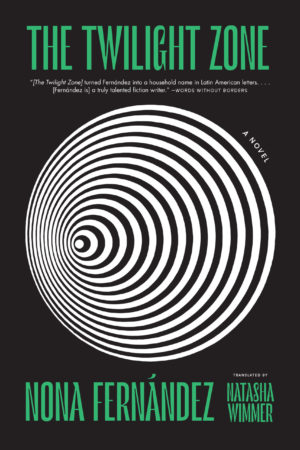The Twilight Zone
by Nona Fernández, translated by Natasha Wimmer
reviewed by JD Debris
Shall I compare thee to a sci-fi show? Or an 8-bit, intergalactic shoot-’em-up? Nona Fernández, in her first two novels to appear in English, has compared Pinochet-era Chile to both. Space Invaders (2019) and The Twilight Zone (2021), both available from Graywolf in Natasha Wimmer’s superb translations, revolve around the metaphysical conceits of their titles. Fernández uses those pop-cultural analogues to counter the lingering repression and secrecy of Pinochet’s regime.
The Twilight Zone appears at a timely moment. US institutions must now decide how they will handle the still-fresh aftereffects of the Trump regime. Post-Pinochet Chile might provide a what-not-to-do guide on the matter. After his overdue dismissal from the presidency, Augusto Pinochet was granted a perpetual presence in politics (a lifelong senate seat, a military commandership) and impunity from his three-thousand-plus criminal charges.
Fernández’s conversational, essayistic narration guides the reader sure-footedly through a minefield of political absurdity, shining a blacklight on doublespeak and empty political theatre. One telling scene in The Twilight Zone takes place at the opening ceremony for the Museum of Memory and Human Rights. The narrator is explaining to her son—and by proxy, the international reader—a small political absurdity that encapsulates the large-scale absurdity of post-Pinochet Chile:
When I told him that the person responsible for everything he had just seen in the museum was one of the men who made the laws that governed the country, he looked at me in puzzlement and started to laugh, assuming I was kidding. At ten, my son was already wise to the bad jokes of Chilean history.
Fernández’s narrator is refreshingly down-to-earth. It’s fair, and uncontroversial, to deduce that this narrator is an authorial stand-in, but Fernández doesn’t use this as an excuse to pose or preen. Her prose is unfussy, limpid, direct. The demotic present tense of her non-narrative morphs seamlessly into collagist digressions: an epistolary chapter addressed to a torturer, interludes in the form of lineated free verse, a chapter in the form of an extended parody of Billy Joel’s “We Didn’t Start the Fire” (“a dumb song,” as Fernández aptly puts it).
In her prose and her collaging are clarity, humility, playfulness. The overall effect is the sort of lightness championed by Italo Calvino—a lightness meant to counterbalance the weight of living. Fernández knows that writing about dark subject matter does not necessitate making the reader’s life more difficult. Her books illuminate rather than bludgeon.
With such lightness, however, comes the risk of glibness, which James Wright once called, with just a touch of hyperbole, “the worst thing that can happen—and not only in the writing of verse.” When stretched too far, one of Fernández’ favored techniques—the overarching metaphysical conceit—can oversimplify and, ultimately, falsify. This is a trap Fernández ran into with Space Invaders. Fernández folds much of the seventy-page Space Invaders into The Twilight Zone. She recycles some of Space Invaders’s best sentences, and some of its worst.
Fernández excels in chronicling the proximity of the banal and the brutal. (“On the same television screen where we used to play Space Invaders, we now saw the national police agents guilty of the murders.”) She’s less successful when mapping pop culture exactly onto history. Repeated verbatim here from Space Invaders is an act of violence in which the victim “flies apart into colored lights” in the manner of an alien from the videogame Space Invaders—a forced image which feeds the overarching formal conceit at the expense of the scene.
A metaphysical conceit works until it doesn’t: there are no perfect analogues, and the writer must eventually either own up to this or drop the conceit. Take Shakespeare’s comparison of “thee” to a “summer’s day,” and the denial of this comparison in the lines that follow. He asks the question—shall I?, etc.—then cops to the inexactitude: the subject of his reverie is so much more than summer. Conversely, Fernández’s comparison points—the TV show, the video game—are, as she’s well aware, so much less than state-sanctioned torture. It seems a dare on her part: to risk facetiousness in exchange for those glowing, bizarre moments in which the innocuous illuminates the unspeakable.
Despite their limitations, these analogues serve a larger purpose as windows into the unfathomable. It’s when Fernández acknowledges the almost laughable inadequacy of these pop-cultural reference points to explain decades of torture and disappearance that The Twilight Zone is at its best. And this time around, Fernández shows a greater willingness to grant her conceits a bit more looseness, a freeing (and honest) degree of inexactitude.
What Nona Fernández’s prose seeks in The Twilight Zone are odd angles, alternate routes, secret hallways into Chile’s national trauma. Even if those secret hallways snake through sci-fi reruns or “dumb” Billy Joel songs, they’re the best hope we’ve got. Even if these attempts come up short, they come a lot closer than the non-attempts of the state: the bad jokes, the euphemisms, the elisions, the boilerplate. What happened to Chile, to its sons and daughters disappeared by force? We’ll never understand. We need to understand. Why not put some sci-fi on in the background and try?
Published on May 17, 2021

